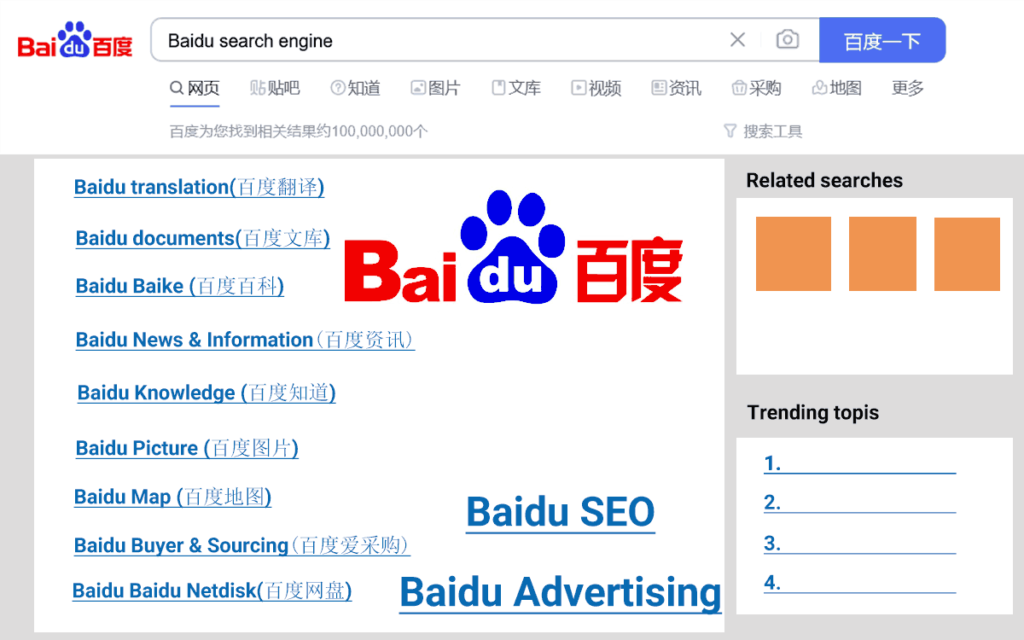China has the world’s largest internet user population, with over 1051 million internet users, over 841 million online shopping users as of June 2022. And With the rise of social media platforms, China has also become a leader in the social media space, with its own unique platforms and user behaviors. In this article, we will explore some of the key facts about Chinese social media, including how it’s different from Western social media and what’s the new trending Chinese social media marketing strategy you need to know if you want to reach Chinese audiences.

Quick Snapshot
- Popular messaging Apps: WeChat And QQ
- Popular short-video App: Douyin, Kuaishou, and WeChat Channels
- The best KOLs platforms: Xiaohongshu and Douyin
- The best social media for marketing: Xiaohongshu and Douyin
- The best online shopping platforms: Tmall, and JD.com
- The best online payments: WeChat Pay and Alipay
- The best social media plus e-commerce platforms: Douyin, Xiaohongshu and Kuaishou
- The best search engine: Baidu search
- The best Question & Answer platform: Zhihu(知乎)
- The best Comics and Animation platforms: Bilibili
- The best dating App: Soul
Table of contents
- Facts you didn’t know about Chinese social media
- Chinese Social Media Marketing Facts
- Facts you didn’t know about Chinese social media marketing
Facts you didn’t know about Chinese social media
•Requires Mobile phone number
In December 2016, each cell phone number was required to be consigned to a real name in mainland China and all Chinese social media platforms require phone number to register account or to use it.
So if you’re trying to register any one of Chinese social media account without providing phone number. That’s not working at all.
•Skip Password set-up
Due to you must provide phone number to register account, so most of Chinese social medias only left “Login With SMS code” option for you. Once you enter your phone number and SMS verification code. Your account will be automatically created.
That said, the password setup process will be skipped, you need to set up password manually after creating account. If you’re from overseas, please don’t rely on SMS code, you probably may not receiving the code sometimes. So, never forget to setup password for your Chinese social media.
•Sensitive words
Each social media has terms of users rules which all users need to follow. But almost all Chinese social media has some special rules differ from west social media that you didn’t know.
You can not talking about other social media’s name in private message if that social media isn’t a instant messaging platform. (There are only two instant messaging platforms in China, that’s WeChat and QQ).
And you should learn China Advertising law when you want to advertising or promoting products or services.
•Contact Info
Most users want to add friends on WeChat or QQ, so they will leave WeChat ID or QQ ID on other social media platforms. That probably could cause your account blocked. Because social media are trying to keep you on their platform rather drive users away to WeChat or QQ.
Especially, think it carefully before leaving your phone number or other contact in on Chinese social media platforms.
•Share link disabled
Like I said, each Chinese social media want to keep users, so if you want to share link from one social media platform to the other one. You may found that either there is no share link, or the shared link can not open.
So, if you don’t familiar with Chinese social media, do not advertise your products or services unless you know how to marketing on Chinese social media.
•Government Regulation of Chinese Social Media
Chinese social media platforms are highly regulated by the government, and content that is deemed inappropriate or politically sensitive can be censored or removed. The Chinese government has implemented strict regulations and laws to control social media use and content, including the requirement for real-name registration and restrictions on the use of virtual private networks (VPNs). Businesses looking to advertise on Chinese social media platforms must comply with Chinese regulations to avoid censorship and other penalties.
•Display user locations
To prevent the spread of misinformation, Chinese social media will display users’ location base on IP address. If form China, only display province name, if outside of China, only display country name. It will not display detail IP address.
•Teen mode (Parental Control Mode)
To prevent kids (juveniles) addicted to social media and gaming, Chinese social media will set up a teen mode for kids.
•Easy Mode
In order to helping the elderly people to use social media. The Chinese social media platforms the easy mode (Care mode) to make the app interface simpler. Like make text size larger, add text to voice function, etc.
Chinese Social Media Marketing Facts
According to the official report <The 50th Statistical Report on China’s Internet Development> from China Internet Network Information Center (CNNIC).
Up to June 2022, China had 1,051 million netizens, and its Internet penetration had reached 74.4%.
And the number of mobile Internet users in China had reached 1.047 billion, up 17.85 million over December 2021. The proportion of China’s netizens accessing the Internet via mobile phones was 99.6%.
The size of rural Internet users in China was 293 million or 27.9% of the national total, while that of urban Internet users was 758 million, up 10.39 million from December 2021, making up 72.1% of the national total.
The user size of online shopping in China was 841 million and the user size of online payment in China had reached 904 million.
Quick Snapshot
- Top 1# Monthly Active Users Social Media App: WeChat (1.309 billion)
- Top 1# Monthly Active Users Short Video App: WeChat Channels (800 million)
- Top 1# Popular Short Video App: Douyin (Chinese TikTok)
- Products Sharing & Review Community: Xiaohongshu
- Books, Videos Sharing & Review Community: Douban
- Popular with women App : Xiaohongshu
- Popular among Young people (Students): QQ and Bilibili
Facts you didn’t know about Chinese social media marketing
Internet changes fast, so does Chinese social media. You should always keep up with the pace of the Internet and change your marketing strategy properly.
In 2023, you need to know what are the new trending social media marketing platforms. And What marketing strategy you should consider.
Keywords: Short video, Livestream shopping, KOLs, interest e-commerce
If go back to 5 years ago, we will highly recommend WeChat and Weibo (the double W age). but now, things have changed. The first choice for Chinese social media are the Douyin and Kuaishou.
And you should pay more attention to livestream shopping and KOLs marketing than ever before.
•Short video
Short video content is extremely popular on Chinese social media platforms, with Douyin (the Chinese version of TikTok) being the most popular platform for short-form video content.
NOTE: Although WeChat Channels has over 800 million monthly active users, but it’s not the most popular short video. It all because it’s the one of two instant messaging app. Douyin is the most popular short video platform.
•Livestream Shopping
Live steaming isn’t a new thing at all. Livestream was used for gaming in 2012, and then Taobao started live streaming shopping in 2016. But it wasn’t particularly popular back then.
With the help from the short-video platforms, Douyin and Kuaishou launched livestream shopping in 2018. The livestream shopping has become increasingly popular.
Since then, when talking about online e-commerce, the first thing that comes to ours mind is “Livestream shopping”.
•KOLs (Key Opinion Leaders)
KOLs (Key Opinion Leaders) play a significant role in Chinese social media marketing. These influencers have large followings and can help brands reach a wider audience.
KOLs in China can be classified into three categories: celebrities, experts, and social influencers. Celebrities are well-known public figures such as actors, singers, and athletes. Experts are individuals who are knowledgeable and respected in a particular field, such as tech experts or fashion experts. Social influencers are individuals who have built a following based on their personality and lifestyle.
KOLs can help brands reach a wider audience and build brand awareness. They can also help brands promote products and services and generate sales. Many KOLs in China work with brands to create sponsored content, such as product reviews or branded posts, which they share with their followers.
•Interest e-commerce
Interest-based e-commerce is a growing trend in China, where social commerce is becoming increasingly popular. Social commerce refers to the use of social media platforms for e-commerce transactions, and interest-based e-commerce takes this one step further by using data and artificial intelligence to create personalized shopping experiences for consumers.
Interest-based e-commerce in China is also driven by the rise of live-streaming e-commerce. Many Chinese consumers enjoy watching live-streams of KOLs and influencers showcasing products, and they can make purchases directly through the live-stream. This has created a highly engaging and personalized shopping experience for consumers, which has helped to drive the growth of interest-based e-commerce in China.
In Conclusion
Chinese social media is a dynamic and rapidly evolving landscape that presents both challenges and opportunities for brands and marketers. With the world’s largest population of internet users, social media platforms in China have enormous user bases, and Chinese social media users are highly engaged and spend a significant amount of time on social media each day.
Social commerce, KOLs, and video content are all significant trends in Chinese social media, and brands that can establish trust and authenticity with their followers are more likely to succeed in the Chinese market. However, the Chinese government heavily regulates social media platforms, and brands need to be aware of local regulations and cultural sensitivities when marketing on Chinese social media. The facts of Chinese social media showing you that Chinese social media must follow the law of China advertising.
As China continues to develop and innovate in the digital space, social media platforms in the country are likely to continue evolving, and it will be essential for brands and marketers to stay up-to-date on new trends and features to stay competitive. Overall, Chinese social media presents a unique and exciting opportunity for brands and marketers to engage with one of the world’s largest and most active online communities.










¡Hola! He querido escribirte porque veo una excelente oportunidad para que tu empresa sea el foco de una *entrevista* que tengo en mente que podríamos realizar.
Esta entrevista no sólo sería una conversación enriquecedora, sino que además, *se publicaría en decenas de medios* y periódicos de gran reputación. Como beneficio adicional, enlazaremos tu sitio web en la entrevista, lo cual ayudará a mejorar su posicionamiento. El hecho de que aparezcas en una entrevista en medios confiables contribuirá a generar más confianza en tu negocio.
¿Sería posible que me dieras un *número de teléfono* para discutir los detalles? Gracias.
Hi, Laura. What can I do for you?